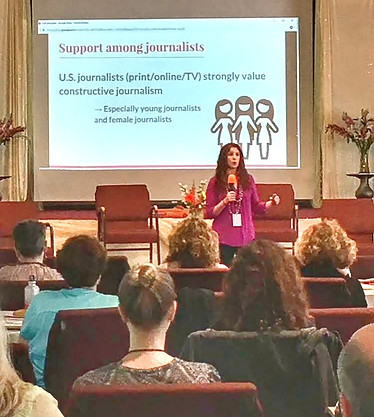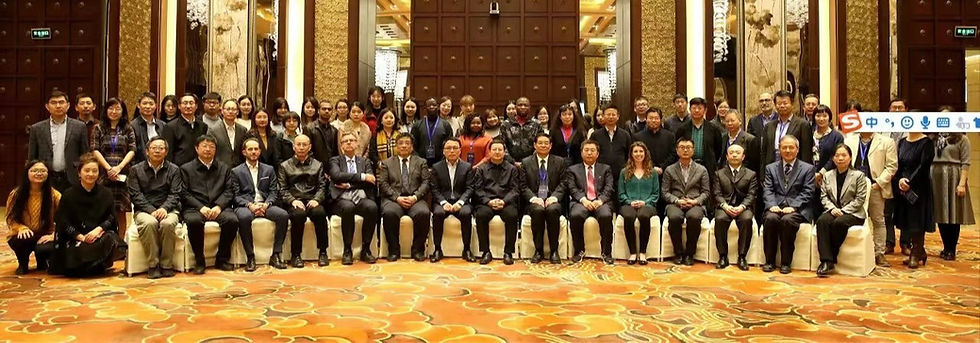Research
Summary
Dr. McIntyre studies socially responsible forms of journalism, such as constructive journalism and solutions journalism — emerging approaches that aim to create more productive news stories that contribute to society’s well being. She co-edited a book on the subject titled Reporting beyond the problem: From civic journalism to solutions journalism.
She also studies press freedom and journalism practice in East Africa. She has conducted fieldwork in Rwanda, Uganda and Kenya, and much of that work has culminated in her book, Press Freedom and the (Crooked) Path Toward Democracy: Lessons from Journalists in East Africa. She served as a Fulbright scholar in Rwanda during the 2018-19 academic year.

Select Publications
-
McIntyre, K., Abdenour, J., Maduneme, E., & Skjerdal, T. (2023). Investigating the gap between journalists’ role conceptions and role performance in Rwanda and Ethiopia. Journalism Studies, 24(12), 1497-1517.
-
McIntyre, K. & Lough, K. (2023). Evaluating the effects of solutions and constructive journalism: A systematic review of audience-focused research. Newspaper Research Journal, 44(3), 276-300.
-
McIntyre, K., & Sobel Cohen, M. (2022). Journalistic role orientations in Rwanda, Uganda and Kenya. International Communication Gazette, advance online publication
-
Lough, K., & McIntyre, K. (2021). A systematic review of constructive and solutions journalism research. Journalism, 24(5), 1069-1088.
-
McIntyre, K. & Sobel Cohen, M. (2021). Public Trust in State-Run News Media in Rwanda. Journalism & Mass Communication Quarterly, 98(3), 808-827.
-
McIntyre, K. (2020). ‘Tell me something good’: Testing the longitudinal effects of constructive news using the Google Assistant. Electronic News, 14(1), 37-54.
-
McIntyre, K. (2019). Solutions journalism: The effects of including solution information in news stories about social problems. Journalism Practice, 13(1), 16-34.
-
McIntyre, K., Dahmen, N., & Abdenour, J. (2018). The contextualist function: U.S. newspaper journalists value social responsibility. Journalism, 19(12), 1657-1675.
Reporting Beyond the Problem
Edited by Karen McIntyre Hopkinson and Nicole Smith Dahmen
Americans say that reading, watching, or listening to the news is a leading cause of stress. Of course journalists, as watchdogs and public informants, must disseminate information that is inherently negative, but experts argue that the news media’s emphasis on the problem has had a negative effect on the public, the press itself, and democracy. At the same time, the past sixty years have seen a rise of journalistic practices that purport to cover the news beyond the typical problem-based narrative. These genres of journalistic reporting are not positive news or fluff reporting: They are rigorous reporting philosophies and practices that share a common goal―reporting beyond the problem-based narrative, thereby exemplifying a commitment to the social responsibility theory of the press, which asserts that journalists have a duty to consider society’s best interests.
AEJMC - Peter Lang Scholar sourcing Series


Press Freedom and the (Crooked) Path Toward Democracy: Lessons from Journalists in East Africa
by Meghan Sobel Cohen and Karen McIntyre Hopkinson
Media scholars argue that access to mass media content correlates with greater support for democracy and opposition to authoritarian regimes, yet research often overlooks developing nations or assumes a linear progression from non-democratic to democratic regimes and from restricted to free press. This book challenges these assumptions, revealing flaws in existing scholarship on media systems in developing nations. It emphasizes the need for a more historically informed understanding of media dynamics amidst political change, democratization, and regression. By studying journalists' perspectives in Rwanda, Uganda, and Kenya, the book explores media landscapes at various stages of development and democracy-building, highlighting the complexities that defy conventional theories. Through qualitative fieldwork and a cross-national survey, it provides updated insights into press freedom, emphasizing the role of factors like proximity to conflict, political milestones, international connections, and civil society strength in shaping a country's media environment.
Oxford University Press. Journalism and Political Communication Unbound Series















